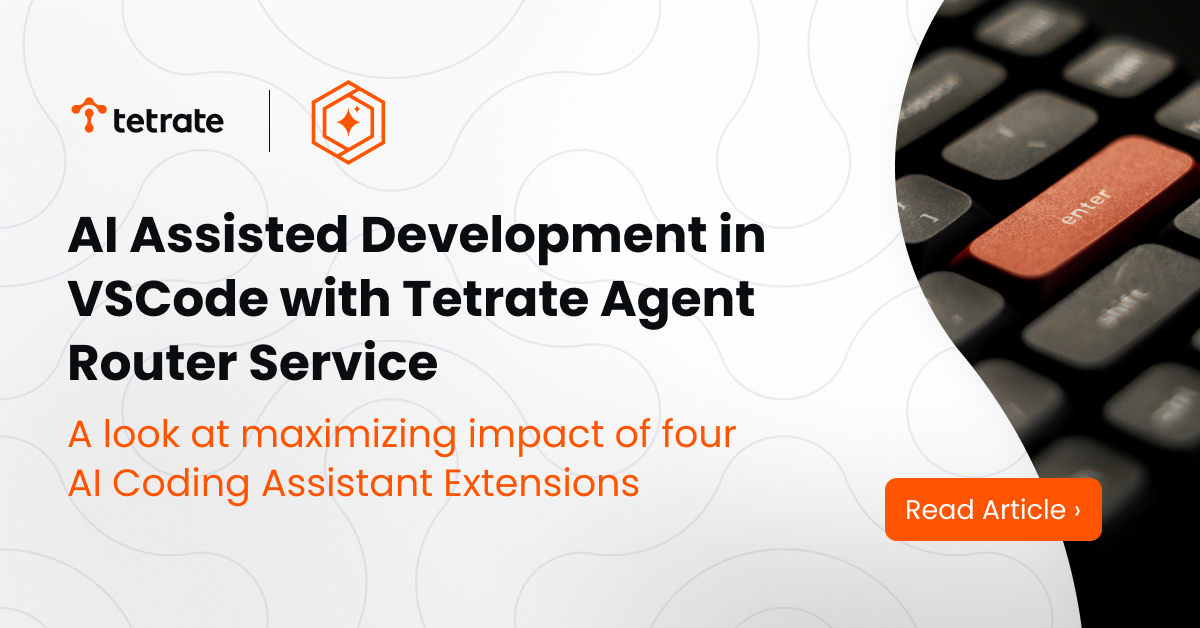AI Assisted Development in VSCode with Tetrate Agent Router Service
If you're comfortable with VSCode, AI-assisted development doesn’t have to disrupt your entire local setup and workflow. Many VSCode extensions integrate seamlessly into your current environment to help you work more efficiently. In this article, we’ll explore four different VSCode extensions, Continue, Cline, Roo Code, and Kilo Code, that you can use with the Tetrate Agent Router Service and share some tips to help you maximize AI-Assisted Development in VSCode.

AI Assisted Development in VSCode with Tetrate Agent Router Service
If you’re comfortable with VSCode, AI-assisted development doesn’t have to disrupt your entire local setup and workflow. Many VSCode extensions integrate seamlessly into your current environment to help you work more efficiently.
In this article, we’ll explore four different VSCode extensions, Continue, Cline, Roo Code, and Kilo Code, that you can use with the Tetrate Agent Router Service and share some tips to help you maximize AI-Assisted Development in VSCode.
Get Yourself Prepared Before You Generate
Before we jump into the actual VSCode Extensions and the tools themselves, let’s talk about some fundamentals. AI can accelerate the best engineers, but it can also amplify chaos. The difference often comes down to one thing: intentionality.

If you fail to plan, you are planning to fail.
The Foundation for Success:
-
Have a plan. First, you need a plan, and you don’t need to go into complete waterfall mode, but plan at least one step ahead, and you can even use AI to help you plan before you build.
-
Be organized. AI agents, like humans, perform better when they can navigate a well-organized workspace. Keep your project’s structure clear—folders, files, and architecture.
-
Be opinionated. Be opinionated about your stack and patterns. When the model understands your tools and conventions, it produces more consistent, desirable results.
-
Automate checking coding standards. And if you have coding standards, automate checking them. Linting, type checks, and CI pipelines can automatically catch and correct issues, even for AI-generated code. Many AI coding agents can observe these results and self-correct on the next run.
The Power of the Tetrate Agent Router Service
For your AI Agent to perform well, it needs access to inference models, and this is where you can use the Agent Router Service. It acts as the connector for your AI-assisted development agents, providing access to inference models from multiple providers in one place. It allows you to control costs, set up resiliency and fallback options, and more.
It’s a SaaS solution that equips your coding agents with the inference (the LLMs) they need to execute work.
Sign up at router.tetrate.ai — and if you register with a business email, you’ll get $5 in credits to start experimenting.
Now Available
MCP Catalog with verified first-party servers, profile-based configuration, and OpenInference observability are now generally available in Tetrate Agent Router Service. Start building production AI agents today with $5 free credit.
One Agent Router Subscription, Four Different Coding Agents You Can Use
Let’s look at some of the most popular developer tools you can use with the Agent Router Service, and how to get the most out of them—four different Coding Agent tools, using one single subscription for AI power through the Agent Router Service.
Continue
Continue is an open-source coding Agent solution that supports you in both “human-in-the-loop” workflows and asynchronous continuous workflows.
- Works inside VS Code for in-editor assistance.
- Offers a CLI for async or batch tasks.
- Integrates easily into CI/CD workflows.
Why it stands out:
Continue is incredibly customizable. You can define reusable rulesets, models, MCP configurations, and prompt templates, making it easy to build repeatable, shareable automation blocks. You can save setup configurations and save them for later use, and easily switch between them.
Check out the Tetrate organization on the Continue Hub to see example configurations and setups for using the Agent Router Service with Continue.
Cline
Cline is the open-source foundation of Roo Code and KiloCode. It offers:
- A VS Code extension for daily AI-assisted coding.
- A CLI for running workflows —great for async or background tasks. This is a recently added feature, and we look forward to seeing what else will be coming here.
- Markdown-based workflow definitions for repeatability.
Pro tip: Define two modes for your agent —Plan and Act —and establish global and workspace rules. Clear boundaries lead to better results and fewer misfires.
Why it stands out:
Cline’s strength is simplicity with structure. It gives you a clean foundation to experiment with, automate, and build repeatable workflows with and for AI, without heavy or complex configuration.
Roo Code
Roo Code extends Cline with more configuration reuse, modes, and “task-first” design. It includes:
- Configuration Profiles and Modes make setup easier and allow reusing model configurations with modes specialized for specific work, such as Planning, Coding, Architecting, and even Writing.
- Orchestrator Mode is a specific and powerful mode for breaking complex work into smaller steps.
- Markdown-defined tasks, triggered by simple slash commands, allow automation of repeatable work.
---
description: "PR description generation"
---
Based on the edits I've done in this git branch compared to the main branch, summarize a short pull request description for me.Why it stands out:
Roo Code allows you to create many reusable configurations through Configuration Profiles and multiple modes, as well as its powerful Orchestrator Mode, which helps break big tasks into smaller pieces of work. This makes it easy to switch between different setups and configurations you have already defined.
KiloCode
KiloCode builds on Roo Code and Cline, combining their best features and adding:
- A Memory Bank to store persistent project context (architecture, stack, etc.).
- A Prompt Enhancer button—great for learning how to write better prompts interactively.
- Modes, tasks, and workflows similar to Roo and Cline, knowing you aren’t missing any of those features
Why it stands out:
KiloCode combines memory, context, and usability in a way few coding assistants do. The Memory Bank turns your agent into a true project collaborator that “remembers” architecture details, dependencies, and conventions across sessions.
The Prompt Enhancer helps you refine your prompting skills as you go, making it both a productivity tool and a learning companion.
Conclusion: Build With a Goal, Have a Plan
The key point is that AI can significantly enhance your workflow, but this improvement depends on your intentional design and understanding of the tools you are using. These tools are more powerful than you might realize, and this summary only begins to explore the possibilities they offer.
Key Takeaways: Plan before you generate
- Organize your workspace.
- Set coding standards (and automate checking the quality of code generated).
- Pick the right mode of working with Coding Agents: pair or delegate.
- Use the Agent Router Service to unify access to your models and billing.
Using the Tetrate Agent Router Service allows you to experiment with and switch between various VSCode extensions and model providers, all while receiving a single bill for your AI usage. The future of software development isn’t AI vs. humans, it’s humans building with AI.
Get started with the Tetrate Agent Router Service today, sign up for a free account and start building with AI.
Now Available
MCP Catalog with verified first-party servers, profile-based configuration, and OpenInference observability are now generally available in Tetrate Agent Router Service. Start building production AI agents today with $5 free credit.










